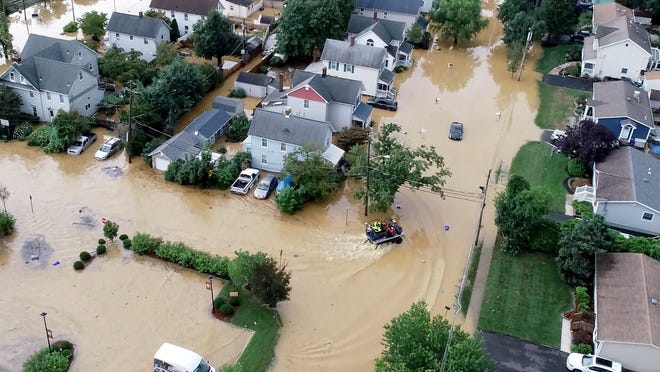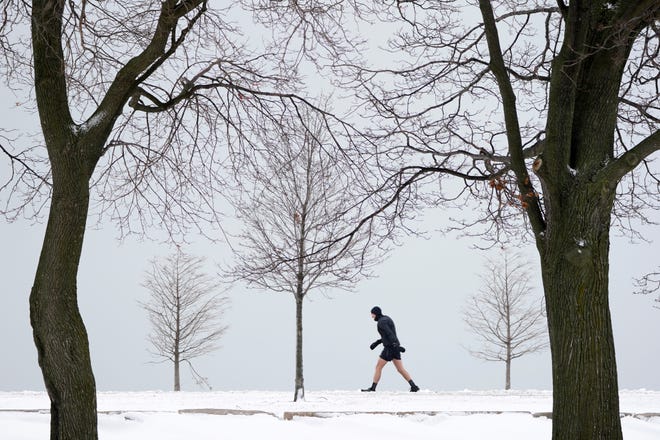
PROVIDENCE, R.I. – Tropical Storm Henri rolled across Block Island before making landfall Sunday in the Rhode Island town of Westerly while blasting much of the Northeast with high winds, dangerous storm surge and record-smashing rainfall.
Henri weakened from hurricane status but remained an imposing storm, lashing the coast with winds of 60 mph and producing 19-foot waves. Tropical storm-force winds extended up to 125 miles.
The slow-moving storm could drop a foot of rain in some places, the National Hurricane Center warned. A tornado or two was possible across parts of southern New England.
"Storm surge, rainfall and wind hazards will extend far from the center," senior hurricane specialist Daniel Brown warned. "This is a life-threatening situation."
Hurricane warnings issued as Henri takes aim at Long Island, New England: 4 dead, 5 still missing in North Carolina after Fred
President Joe Biden said at an afternoon briefing that he has approved emergency declarations for Rhode Island, Connecticut and New York, which activates recovery funds. He said he has been in contact with the governors of the states most likely to be affected.
"I urged them to take advantage of the assistance FEMA can offer in advance,'' Biden said. "I'm committed to do everything we can to support their communities through the storm and afterwards.''
More than 21 million people were under tropical storm warnings. Henri was forecast to slow down and possibly stall near the Connecticut-New York border Sunday night, followed by an east-northeastward motion across northern Connecticut and southern Massachusetts on Monday. A slower forward speed means the storm could dump more rain on those areas.
"Dangerous storm surge, strong gusty winds, and flooding rainfall are expected across portions of the northeastern United States," the hurricane center said.
The storm pummeled the region well before landfall. Saturday was the wettest day in New York City in seven years, the National Weather Service said. The 1.94 inches of rain that fell in Central Park from 10 to 11 p.m. made it the wettest hour in the city's history.
Rhode Island Gov. Dan McKee said the state was hit hard. About 70,000 homes and businesses were without power Sunday afternoon, according to the website PowerOutage.US. Up to 300,000 people, more than a quarter of the state's population, could lose power before the storm passes, McKee said.
With temperatures expected to climb to the 90s by Tuesday, McKee said the top priority was to restore power to those residents and businesses.
He also had a message for state residents: "Yesterday I asked you to prepare for the storm; today I'm asking you to stay home. If you venture out, you are not only putting your own life at risk, but you are endangering first responders."
State Police Col. James Manni said most people were following orders to shelter in place in coastal communities, but surfers who ignored the warnings were "a major challenge to safety."
"Asking all surfers to use your head and don't go in the water," Manni said.
Collette Chisholm, who has lived in Westerly for 20 years, said the waves were much higher than normal, but she wasn’t concerned about damage to her home.
“I love storms,” she said. “I think they’re exciting, as long as no one gets hurt.”
Narragansett housemates Lindsay Agvent and Shayna Fidler, both 22, watched the pounding surf from the patio of the Coast Guard House.
“It’s the most wind I’ve ever seen,” Agvent said. “We’ve lost power, and our neighbors have some trees down.”
Rainfall of 3 to 6 inches over portions of Long Island, New England, southeast New York, New Jersey and northeast Pennsylvania was expected into Monday, and isolated maximum totals could approach 12 inches, the hurricane center said.
Cranbury, New Jersey, was blasted with almost 9 inches of rain by Sunday morning. In New York, Brooklyn had more than 6 inches, Central Park almost 5 inches. Residents and visitors on Fire Island, a narrow strip of sandy villages barely above sea level off Long Island’s southern coast, were urged to evacuate.
Season at its peak:As hurricane season enters its peak, NOAA's updated forecast calls for even more storms: 21 named systems
The severe weather cut short a superstar-laden concert Saturday in Central Park. The show headlined by Bruce Springsteen, Paul Simon and Jennifer Hudson celebrated New York City’s recovery from the coronavirus. Officials asked concertgoers to leave the park during Barry Manilow’s set amid the threat of lightning.
"While it's disappointing that tonight's concert had to end early, the safety of everyone in attendance had to come first," Mayor Bill de Blasio said on Twitter.
Another busy season:NOAA predicts another busy Atlantic hurricane season with up to 20 named storms possible
Gov. Ned Lamont warned Connecticut residents they should prepare to shelter in place from Sunday afternoon through at least Monday morning. About 30,000 power outages had been reported Sunday afternoon, according to PowerOutage.US.
"We are following the flooding possibilities very closely," Lamont said at a news conference.
Hurricane season in a pandemic:Here's what you need to protect yourself and your family
Boston Mayor Kim Janey urged residents to stay home or take public transportation if travel was necessary. She said the city expected damaging winds, power outages and flooding.
Massachusetts Gov. Charlie Baker activated the National Guard for water rescues, debris clearing and public safety support. The order allows for up to 1,000 soldiers and will remain in place until support is no longer needed, he said.
Biden reminded affected residents they may need to seek shelter at a time when COVID-19 remains a threat, so he urged them to to wear a mask, practice social distancing and get vaccinated.
"Everyone across the country: Don't be caught by the next storm. Get vaccinated. Get vaccinated now,'' he said.
Bacon reported from Arlington, Virginia. Contributing: Jorge OrtizNoori Farzan, The Providence Journal; The Associated Press

Source link










